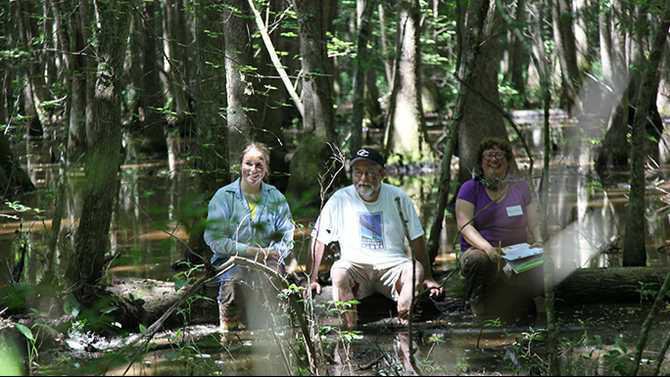More than knowledge
While area teachers and Oxford Institute for Environmental Education (OIEE) faculty both benefit and learn from the annual, week-long program that gives teachers professional development in science education, expanding what they know is not the only aspect of this “win-win relationship.”
Teachers trampling through the swamp was the product of a partnership between Oxford College and Newton County School System (NCSS). According to Samantha Greco, a fourth-grade science and social studies teacher at West Newton Elementary School who attended OIEE this year, teachers receive four Professional Learning Units (PLUs) from the Georgia Department of Education for completing OIEE.
NCSS teachers also receive a $200 stipend and a $200 classroom grant, which participating teachers said they would use to implement what they learned at OIEE in their classrooms.
In addition, the Georgia Wildlife Federation (GWF), which hosted OIEE at the Alcovy Conservation Center (ACC), partnered with the Fish and Wildlife Service (FWS) to provide a $1,000 grant for schoolyard enhancements.
“They want teachers who have a (science) curriculum to teach in the schoolyard,” said Eloise Carter, professor of biology at Oxford College and OIEE faculty.
Teachers who complete OIEE are eligible to apply for the FWS grant.
From mud angels to learning about leaves, a group of area teachers and students gained hands-on experience in Georgia's wetlands to better their education and teaching abilities.
The Oxford Institute for Environmental Education (OIEE) hosted its annual program at the Georgia Wildlife Federation (GWF) Thursday as part of the week-long session to provide professional education to K-12 science teachers about environmental science and sustainability issues and help enhance interactive, non-textbook learning. Among the participants stomping through the swampy banks and forest were five local Newton County teachers.
Steven Baker, associate professor of biology at Oxford College, said the purpose of founding OIEE, which has been a regular part of the summer schedule at the school for more than 20 years, was to give Oxford faculty the opportunity to help improve science education in the state of Georgia.
"It's a rewarding experience, and we know it works," Baker said. "OIEE makes a difference in these teachers' approach to science education."
Baker and other OIEE faculty focused Thursday on the schoolyard investigation plan (SYIP). They showed participants how to implement SYIPs just outside their classrooms by using the GWF, which has more than 115 acres of land along the Alcovy River at the Alcovy Conservation Center (ACC) in Covington, to teach scientific principles they can then teach their elementary, middle and high school students.
"All teachers are underfunded and under-resourced," said Eloise Carter, biology professor at Oxford College. "We can show them how to use what they have to create great science learning."
Carter and Baker led the group into the tupelo swamps at the ACC to determine where wetlands begin, what a wetland is and why wetlands matter. Three subgroups located indicator species and soils along the wetland-woodland line, taking samples and collecting data to test hypotheses.
The learning during this program is a two-way process, Carter said.
"For one thing, when we spend time with K-12 teachers, we are looking at the educational lifecycle of our own students," Carter said. "It helps us understand the development of young scientists.
"But it's symbiotic. We are learning to be better teachers partly due to what we learn in OIEE. The way we all work together is through open discussion. We are influenced by how the teachers in OIEE interact with us and what we teach. It is kind of a collective, a constant morphing and development of ideas. And we are all happy to steal ideas. It's a win-win relationship."
And the teachers reiterated this mutual relationship.
Dakotah Campbell just finished his first year teaching at Newton High School, moving in the fall to 11th grade environmental science from 10th grade physical science. He said he participated in OIEE to be able to make his classroom more engaged and have the ability to learn more.
"To realize what's around you, what's specifically outside your door, not even across the country or anything," Campbell said, "and get right in there. That's important to me."
He said Thursday's activities will help him teach more efficient sampling and bring a wider diversity of life to the schoolyard.
Samantha Greco, a fourth-grade science and social studies teacher at West Newton Elementary School, said she wanted the opportunity to learn more about her curriculum. Ecology is now part of the curriculum as West Newton will become a STEM (science, technology, engineering and math) school in the fall.
"If you can use what's outside your building, it saves on the budget, and it gives kids ownership of their surroundings," Greco said.
Two Rocky Plains Elementary School teachers were also in attendance.
Theresa Marvinny teaches second grade and brought a STEM lab to her school. She said she wants to draw more science education and try to get a schoolyard classroom to teach students outside. She said she intends to use knowledge gained from OIEE to apply for a grant to get a STEM lab for grades K-2 and 3-5.
Karen Rogers, a seventh- and eighth-grade math and science teacher at Montessori School of Covington said she wants to improve her science teaching and find an effective way to design SYIPs. She said she hopes to incorporate the OIEE inquiry model into her classroom.
Baker estimated about 400 K-12 teachers from Georgia and north Florida have attended OIEE over the years.
"It's a privilege to get to work with these teachers and make a difference," Baker said. "Plus, it's fun."





